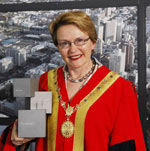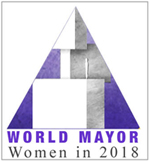
Hlen Zille, Mayor of Melbourne with the World Mayor Award, which she won in 2008

FRONT PAGE
About World Mayor



• VOTE NOW
• The 2014 short list
• The 2014 longlist
• Code of Ethics
• The World Mayor Prize

The 2012 results
The 2012 project
The 2012 shortlist
The 2012 long-list
Code of Ethics | Código de Ética |
The World Mayor Prize
World Mayor Prize winners exchange letters

The 2010 results
The 2010 project
The 2010 finalists
Code of Ethics | Código de Ética |
The World Mayor Prize
Marcelo Ebrard says thank you
Mick Cornett says thank you
Helen Zille and Marcelo Ebrard exchange letters

The 2008 results
The 2008 project
The 2008 finalists
The World Mayor Award
Helen Zille thanks supporters
Mayors of Melbourne and Cape Town exchange letters
With Mayor of Cape Town
With Mayor of Zurich

On Mayor of Cape Town
On Mayor of Chacao
On Mayor of Gothenburg
On Mayor of Guayaquil
On Mayor of Marikina City
On Mayor of Memphis
On Mayor of Nuremberg
On Mayor of Phoenix
On Mayor of Porto Alegre
On Mayor of Tehran
On Mayor of Villa Nueva
On Mayor of Zurich

The 2006 results
Methodology
The 2006 finalists
The World Mayor Award
Dora Bakoyannis congratulates John So

The 2005 results
Contest methodology
List of finalists
Winning mayors write
Mayor Rama writes - Mayor Bakoyannis replies

The 2004 contest
List of all 2004 finalists
Edi Rama wins 2004 award
People ask - Edi Rama replies

Front Page
Site Search
About City Mayors
Some 205,000 people took part
in the 2008 World Mayor Project
By Tann vom Hove, Editor
14 October 2008: The aim of the international World Mayor project, which was launched by the urban affairs think tank City Mayors in January 2004, is to raise the profile of mayors worldwide by honouring those who have served their communities well and have made significant contributions to cities nationally and internationally. Participants in the competition are invited to nominate and vote for city leaders who excel in qualities like: leadership and vision, management abilities, social and economic awareness, ability to provide security and to protect the environment as well as the will and ability to foster good relations between communities from different cultural, racial and social backgrounds. The most outstanding mayor is presented with the World Mayor Award, designed by Manuel Ferrari. The 2008 winner of the Award is Helen Zille, Mayor of Cape Town. Previous winners were Edi Rama, Mayor of Tirana (2004), Dora Bakoyannis, Mayor of Athens (2005) and John So, Mayor of Melbourne (2006). Runner-ups receive the World Mayor Certificate.| First round | Second round | Votes | Consultation | Questions & answers |
The World Mayor Project and City Mayors have no connection with any city or organisation and are run on strictly non-commercial lines. Sponsorships, advertising, subscriptions, donations or any other kind of revenues are not sought and are rejected, if offered.
The first round
The 2008 World Mayor Project was conducted over an 18-months period, starting in spring 2007. During 2007, City Mayors, the organisers of the project, invited a worldwide audience to submit nominations of mayors deemed worthy of being among the most outstanding city leaders in the world. More than 74,000 voters nominated a total of 820 mayors for the 2008 World Mayor Award. Some mayors received thousands of nominations while others collected only a handful. The organisers of World Mayor 2008 only considered nominations, which were accompanied by supporting testimonials.
Based on the number of nominations and the persuasiveness of testimonials, the editors of City Mayors drew up a long-list of 50 finalists. The list included 11 mayors from Asia, 10 from North America and 11 from Latin America as well as 15 mayors from Europe and 3 from Africa. Long list of 50 mayors
The second round
Some of the 2008 finalists for the World Mayor title were from the world’s best-known and largest cities, while others represented smaller communities. Most of this year’s finalists were being short-listed for the first time. Under the World Mayor rules, winners and runner-ups from previous years were not eligible. They include John So, Lord Mayor of Melbourne (Australia), Job Cohen, Mayor of Amsterdam (Netherlands), Hazel McCallion, Mayor of Mississauga (Canada) and Edi Rama, Mayor of Tirana (Albania).
During the second round of World Mayor 2008, from January to July 2008, voters were invited to select from the long-list of 50 their choice of title candidate. Participants could select one mayor from each world region. While in previous years, simple click voting was permitted, although not encouraged, in 2008 this voting method was not allowed. In order to have their votes registered, participants had to provide a reasoned comment. Some 205,000 people from around the world participated in the second round of World Mayor 2008.
When setting up the rules for the project, City Mayors, the World Mayor organisers, emphasised that the strength of argument expressed in supporting statements was more important than the number of votes. By stressing the significance of well-argued comments, the organisers aimed to ensure that the contest participants thought about the merits of their chosen mayors. Publication of some of the comments on the World Mayor website also enabled comparison. These rules also allowed mayors from smaller cities to compete on equal terms with mayors from large metropolises.
The editors of City Mayors are very much aware that an outstanding mayor from a city in the developing world requires different qualities from a mayor in Western Europe or North America. The winner of the annual World Mayor Award will therefore never be described as the ‘world’s best mayor’.
Origin of votes
Slightly more than 205,000 people from around the world took part in the second round of World Mayor 2008. With a share of 27 per cent of the total, Latin America contributed the largest number of votes, an increase of 15 percentage points compared to 2006. The rise in votes is largely due to the presence of a number of prominent mayors from Central and South America in the 2008 long-list of finalists. In fact, the final short-list of eleven mayors includes four South American city leaders. The share of votes from North America fell from 24 per cent in 2006 to 18 per cent two years later. The decrease is partly due to the presidential primaries, which occupied the minds of the US public during the early months of 2008. With the absence of a strong vote winner, like Melbourne Mayor John So in 2006, the share of votes from Asia and Australasia dropped from 33 per cent to 21 per cent. Africa’s share of the vote, largely due to the popularity of Cape Town Mayor Helen Zille, shot up from five per cent in 2006 to 11 per cent in 2008.
|
World region |
2008 share of votes |
2006 share of votes |
|
Europe |
23% |
26% |
|
USA & Canada |
18% |
24% |
|
Latin America |
27% |
12% |
|
Asia & Australasia |
21% |
33% |
|
Africa |
11% |
5% |
The consultation process
In July 2008, City Mayors’ editors drew up a short-list of eleven mayors, who stood out in terms of number of votes and quality of comment from their supporters. Between July and the end of September, the organisers of the World Mayor Project, consulted and took advise on who of the eleven mayors from the final shortlist should receive the 2008 World Mayor Award. Among the editors of City Mayors, Helen Zille was the unanimous choice for the Award. She, together with Zurich’s Mayor Elmar Ledergerber, was also strongly backed by members of international organisations and the business community, while Leopoldo López, Mayor of Chacao, enjoyed much support among US universities. (The mayor studied at Harvard.)
While the total numbers of votes cast for the mayors in the top eleven exceeded 85,000, the number of votes received by individual mayors did not have a significant bearing on the decisions by the judging panel of editors. They were primarily influenced by the passion and persuasiveness of testimonials bestowed to mayors. As some city leaders in the top eleven represent communities of several million people while others are mayors of cities of less than 500,000 residents, the City Mayors panel of editors was of the opinion that basing judgement on numbers alone would unfairly disadvantage mayors from smaller cities.
Question and answers
The World Mayor Project invited supporters from the top two mayors of 2008, Helen Zille (Cape Town) and Elmar Ledergerber (Zurich), to submit questions to the mayors. Mayor Zille described the questions put to her as very penetrating. She also said that she tried to provide substantial and detailed answers. “It has been a useful exercise,” she added.
When asked what made her become a journalist before entering public life, she replied: “The person I am is largely a product of my upbringing and the example set by my parents, who left Germany separately during the 1930s. They raised their three children (of which I am the eldest) to be politically and socially aware, to resist injustice and to be responsible members of society. One of the most compelling memories of my youth is of my mother telling us about the people who sought help at the Black Sash Advice office. My mother was a volunteer there and dealt with the tragic consequences of apartheid’s laws on people’s lives. These discussions brought home the reality of apartheid in a way that few other middle class families experienced. Another strong memory is of the long drives to school with my father. We would buy the liberal newspaper, the Rand Daily Mail, at the start of the journey and I would read the news to him as he drove. We would then discuss current events, and talk about what could be done about the injustices of the time. These experiences shaped me, and attracted me to journalism. I had outstanding editors who gave me real opportunities. Each opportunity led to the next. I resigned after my editor and mentor, Allister Sparks, was unjustly dismissed despite his enormous contribution to exposing the truth about apartheid South Africa.
A supporter of Elmar Ledergerber asked whether running Zurich, a city that has often been voted the best city in the world, is relatively easy. The Mayor replied: “It is definitely not an easy job. By combining farsighted and balanced measures with constant renewal and innovation, we continue to keep the living standard high and thus attract further business and residents to the city. This does not leave the city without its problems and demands a high level of dedication. Up to 80 or even more hours worked per week are a normal standard. Fortunately, the city council consists of nine members in total. Together we do what we can to not only maintain but to enhance the level achieved.”

Please nominate your candidate for the 2018 World Mayor Prize
